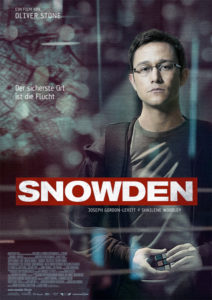 Unless you never watch the news or have been hiding under a rock for several years, you’ve probably heard of Edward Snowden. A gripping documentary called Citizen Four was made about him in 2013 and won the 2015 Oscar. Here’s what I said about that film:
Unless you never watch the news or have been hiding under a rock for several years, you’ve probably heard of Edward Snowden. A gripping documentary called Citizen Four was made about him in 2013 and won the 2015 Oscar. Here’s what I said about that film:
In January of 2013, filmmaker Laura Poitras began receiving emails from a mysterious person who only identified himself as “citizenfour” and who had information about US government surveillance on a scale unheard of in history. A few months later, after a number of encrypted email exchanges, Poitras headed to Hong Kong along with journalist Glenn Greenwald to meet the sender. The rest is history. Waiting for them in a hotel room was Edward Snowden who would hand them evidence of massive citizen surveillance and data mining by the NSA and other government agencies, and would expose our global cyber-spy program.
Oliver Stone’s new movie Snowden begins in that hotel with Poitras (Melissa Leo) and Greenwald (Zachary Quinto) and flashes back to Snowden’s (Joseph Gordon-Levitt) tortured path to this clandestine meeting. The film succeeds in telling its story without becoming a typical Oliver Stone polemic. Whether that is a good or bad thing is up to you.
The film relies on a love story for its non-computer geek center. After Snowden fails at his quest to serve his country in the Army, he finds that he can be a proud patriot using his astounding computer skills. And at the same time he meets the girl of his dreams, though he can’t discuss his work with her since she doesn’t have clearance. And as he rises through the ranks of the intelligence community, working for the CIA, NSA, and other cybersecurity agencies and later as a contractor, he realized the extent to which the government is spying on ordinary citizens and finally decides to steal the proof and hand it over to journalists. His relationship with his girlfriend Lindsay Mills (Shailene Woodley) makes his decision harder to make, knowing that he may have to disappear from her life, and that he has to make the decision without her input.
Most people will have probably made up their minds about Snowden before they see this film. Either he is a traitor or a hero. And the film probably won’t change a lot of opinions. But Gordon-Levitt turns in a great performance getting Snowden just right, his mannerisms, his voice. And though you know the outcome from the beginning, so it isn’t really a thriller, it is a strong explication of how and why Snowden is now living in Moscow. It is a film worth seeing for all the issues it forces you to think about, including the way that we as a society deal with whistle blowers. And it would make a great double feature with the doc Citizen Four.
[I was fortunate to attend a screening followed by a live-streaming Q & A with the cast, Stone, and Snowden himself. He is extremely articulate about why this matters. I wish they could take a few clips from that interview and add them at the end over the credits. It could change a few people’s opinions. And there are people out there right now lobbying Obama to pardon him before the end of his term. ]

I agree with Arty on this one. I also saw the Q&A with Snowden (live via satellite from Russia), along with Stone, Gordon-Levitt, and Woodley (from NYC), and I found Snowden to be surprisingly engaging and articulate. He made a very strong argument for the necessity and obligation for people to engage in dialogue about privacy issues, national security, and how that balance might be safely achieved. That said, there’s no doubt the movie glosses over the most serious allegations against Snowden and their implications for national security. Instead, it focuses on humanizing Snowden and his girlfriend (who certainly comes off stronger and more sympathetic in the film than she did in the mainstream media in the aftermath of the leak), and exploring the roots of his actions between 2004-2013. “Snowden” is not likely to to change any minds of those who come down firmly on the side of whether he was right or wrong. But it could have some sway over those inclined to be sympathetic or cynical about the government’s abilities to peer behind the cyber curtain of friend and foe.